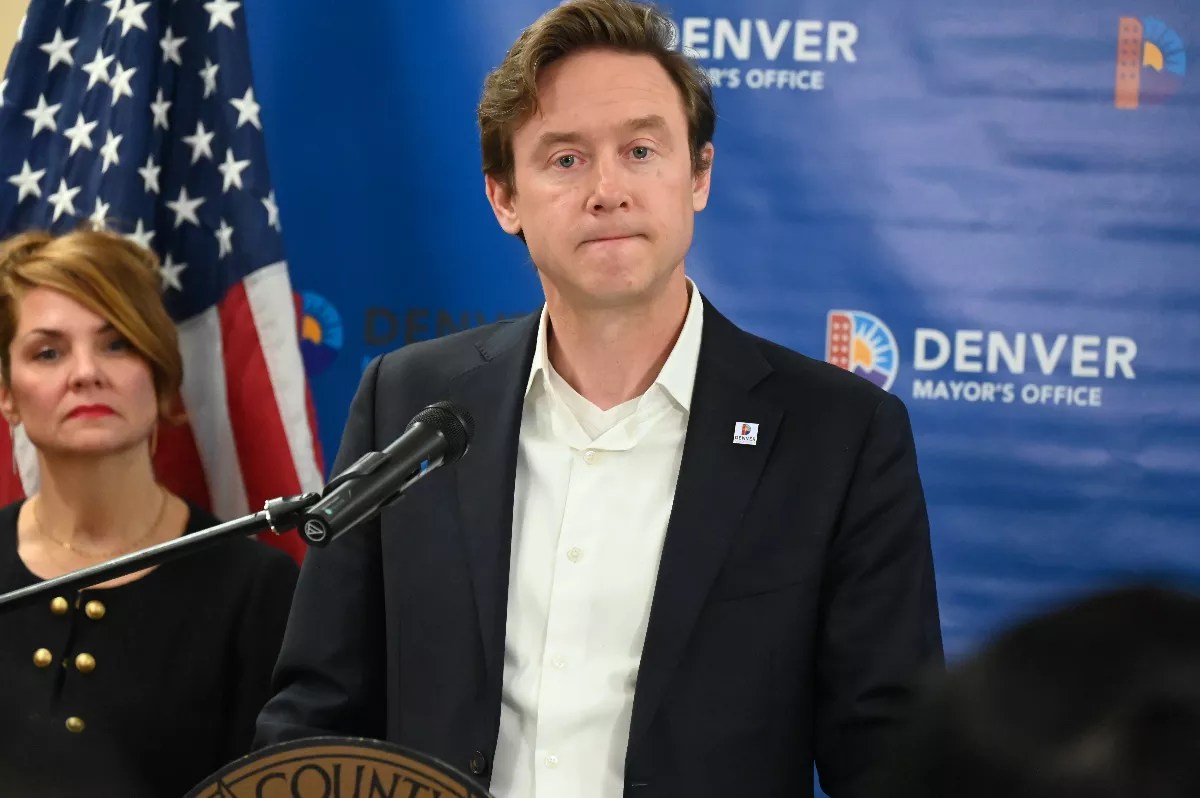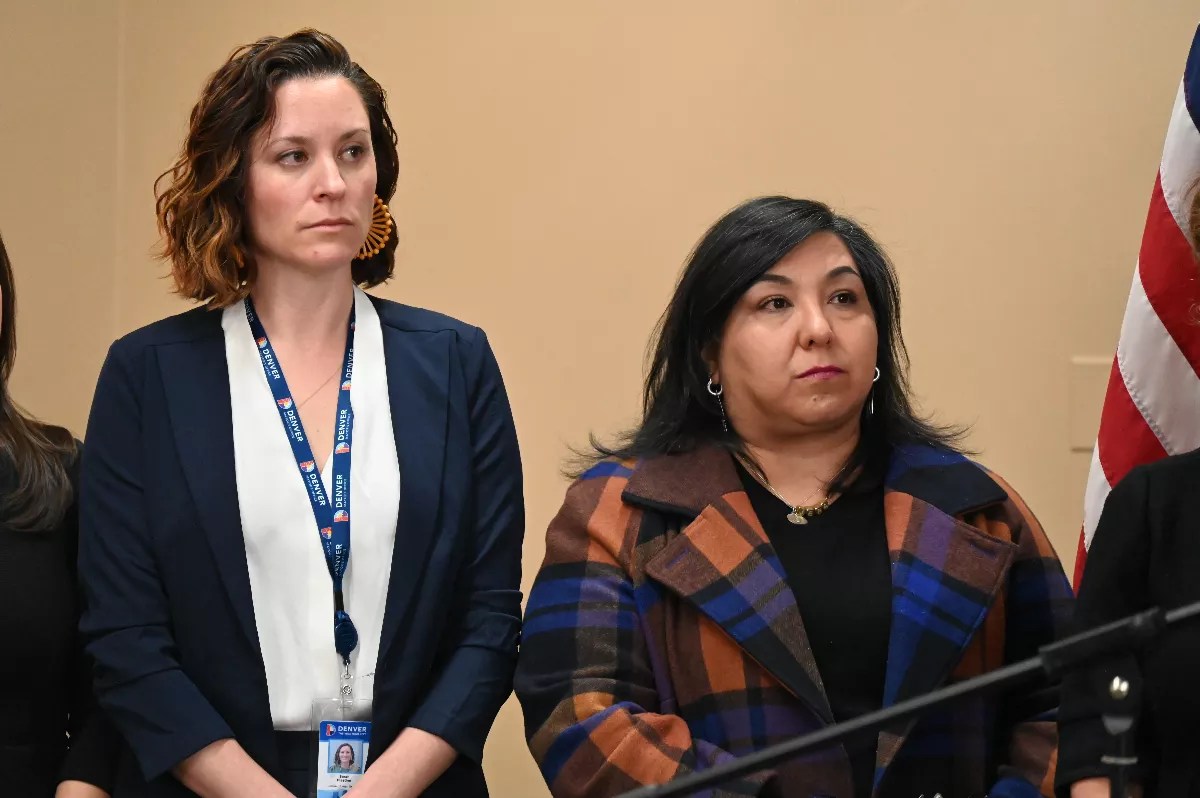
Bennito L. Kelty

Audio By Carbonatix
The migrant crisis in Denver is Mayor Mike Johnston’s biggest challenge so far in 2024.
Since December 2022, more than 39,000 migrants, mostly from Venezuela, have shown up in Denver. To the tune of $58 million – all funded by local taxes – the City of Denver has either put them in hotels converted to shelters or bused them to other locations.
For Denver to keep housing, transporting and feeding migrants through 2024, Johnston had predicted the city would need $180 million. To slash $60 million off that figure, he announced today, February 28, that the city will close four of its ten migrant shelters during the next month, at a rate of one per week.
The mayor clarified that “no one is being displaced from these shelters, no one’s length-of-stay policy will be changed,” which means that families with children can still stay for 42 days in a shelter, and families or individuals without children can stay for fourteen days.
The ten migrant shelters that the city is financing and operating include seven motels and hotels converted into non-congregate migrant shelters; two congregate shelters currently on standby; and the Mullen Home, according to the Denver Department of Human Services. The shelters are mostly spread across Denver, with one in Aurora.
“The great bulk” of migrant sheltering has taken place at the seven motels and hotels that provide non-congregate shelter, or individual rooms. All four of the shelters that are closing are among those seven sites and include the one in Aurora and three in northeast Denver.
Migrants who still have time to stay in a shelter but are in one that is closing will be moved to another shelter, according to Johnston, who said the city isn’t just closing, but “consolidating” the shelters. The shelter closures will “only move 300 people total,” he added.
“The reason we’re phasing these out one per week over the next four weeks is we have organized the populations of those hotels to be naturally drawing down,” Johnston said. “As they draw down close to a close, we will consolidate them, and anyone left at that site will move to another site.”
Two other congregate sites – the McNichols Building and a church – will be kept on standby in case of an overflow of people at the non-congregate shelters, but they have not hosted migrants for the past few weeks. The McNichols Building was used as a cold-weather shelter for the homeless this week, however, and the Mullen Home will remain open and continue to host only families.
The city also expects to discharge about 4,000 migrants from shelters during March through a local length-of-stay policy. This only includes migrants whose 42 or fourteen days are up.
Closing shelters is a piece of a “four-part strategy” meant to “reduce the cost of our migrant program all while making sure we’re delivering high-quality services,” the mayor said.
Johnston’s Four-Part Migrant Plan
The first part of this strategy began in late January, when the city reinstituted its length-of-stay policy, which has led to 2,500 people leaving Denver’s migrant shelters and “has cut our nightly shelter population almost in half,” Johnston said.
Another ongoing part of the strategy was to “double down on very high-quality case management so we could exit people successfully to housing and work opportunities without having them end up unhoused or on the streets,” the mayor added.
“We have brought on nonprofit partners who have very successfully case-managed and navigated those folks to work, to housing, to opportunity,” he said during his press conference. “So we have not seen significant increases of folks who have ended up unhoused on the streets.”
The third part of the mayor’s strategy is to continue offering bus tickets to other locations. Johnston said that about 40 percent of migrants who arrive in Denver travel onward to a second destination. The city has said previously that about half of arriving migrants take this option.
The city has also been setting up clinics where migrants can get help applying for federal work authorization. Most of the migrants who arrive in Denver can’t legally work because of their immigration status, but a few avenues are open for them to work, including Temporary Protected Status for some Venezuelans, or the granting of asylum.
Through “an unprecedented effort,” the city has helped 600 migrants get work authorization with these clinics during the past few weeks, Johnston said. The city now plans to assist another 700 migrants through work authorization clinics in the coming weeks.
According to Johnston, this “will be more than 1,000 individuals who have now processed work authorization and will get access to legal work authorization during the next thirty days.”
“The single most important thing we can do to help connect people to the opportunity is to connect them to work authorization,” he added.

Denver’s first Newcomer Program director, Sarah Plastino, stands next to Denver City Council President Jamie Torres as Mayor Johnston details his migrant response strategy.
Bennito L. Kelty
Other Ways Denver Has Addressed Migrant Crisis
Johnston also introduced the city’s first Newcomer Program director, Sarah Plastino. Although Plastino didn’t speak to the press, Denver City Council President Jamie Torres worked with Plastino when Plastino was at the Rocky Mountain Immigrant Advocacy Network and said she was “overjoyed” to welcome the new agency head.
“This is not unfamiliar territory for Sarah,” Torres said at the press conference. “I really welcome the expertise she’ll bring to this space and help us navigate both what does the response look like and what does integration look like.”
Johnston lobbied for federal support during a pair of visits to Washington, D.C., but a bipartisan border bill that would have allocated $1.4 billion to local migrant shelters and programs died in the U.S. Senate on February 6.
Johnston and his administration have been looking for other ways to cover the cost of supporting migrants with the city’s coffers. He has asked city departments to cut their respective budgets by about 10 percent, and in early February, he revealed a plan to save an additional $5 million by cutting rec center hours and Denver Motor Vehicle Division services.
The closure of Denver’s migrant shelters comes days after the Aurora City Council voted to pass a resolution declaring that the city can’t afford to support migrants. Without naming other cities or names, the resolution also charged that Aurora has “received a large-scale influx of new migrants, many of which have been transported to the City of Aurora by other municipalities without notice.” Colorado Springs passed a similar resolution last month.
Johnston addressed the resolutions from both cities on Wednesday.
The claim that Denver is transporting migrants to anywhere “is not true,” he said. “We’re not sending people to anyone. They’re welcome here in Denver, and we’re looking for the support they need. But we’re not sending them to those cities.”
Migrants who choose onward travel don’t usually go to neighboring cities, according to the City of Denver, adding to its claim that it doesn’t bus migrants to Aurora. In the resolution Aurora City Council passed on Monday, it acknowledges that some migrants arrive “on their own volition.”
But Danielle Jurinsky, the Aurora councilwoman who sponsored the controversial migrant resolution, calls Johnston’s comments “a bald-faced lie,” simply because Aurora hosted one of Denver’s migrant shelters. “If that is his stance, I don’t know who is calling the shots in Denver,” Jurinsky says.
In a statement, the Denver mayor’s office said again on Wednesday that “Denver has not sent any new guests to the hotel/shelter in Aurora since approximately mid-December. As of today, there are only ten guests there.”
Cities that “bet on being anti-immigrant” lose throughout history and “over centuries,” Johnston added during his press conference. “Look and see how those cities have done,” he said. “Those cities have been on the losing side of history at every single moment.”
Juinsky’s response: “Tell him I’ll take him up on that bet in two, three years.”
However, the Aurora councilwoman clarified that the migrant resolution she spearheaded “isn’t an anti-immigration policy. This is letting our residents know their tax dollars will continue to support Aurora residents.”
The Aurora shelter operated by the City of Denver will close next week, according to Denver Human Services spokesperson Jon Ewing, but he notes that only “a handful of people” are living in it. Ewing reiterated that the city has not sent any migrants to that shelter since early December.
As of Wednesday, close to 2,400 migrants were staying in Denver’s migrant shelters, half of the all-time high of 5,000 migrants that were in shelters during a harsh cold spell in mid-January.